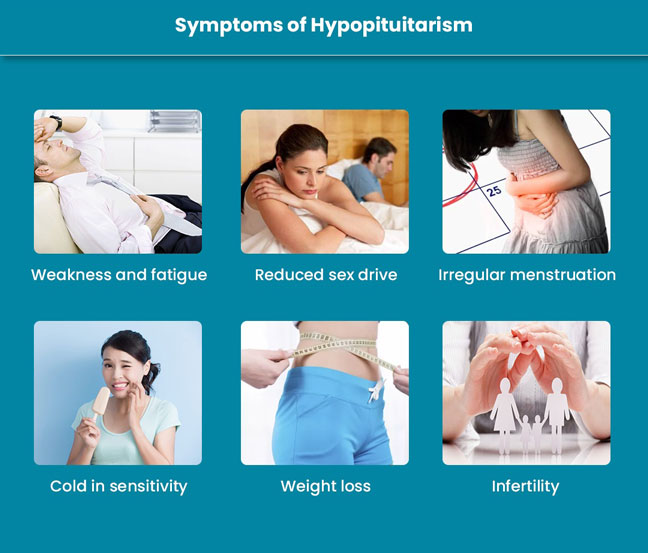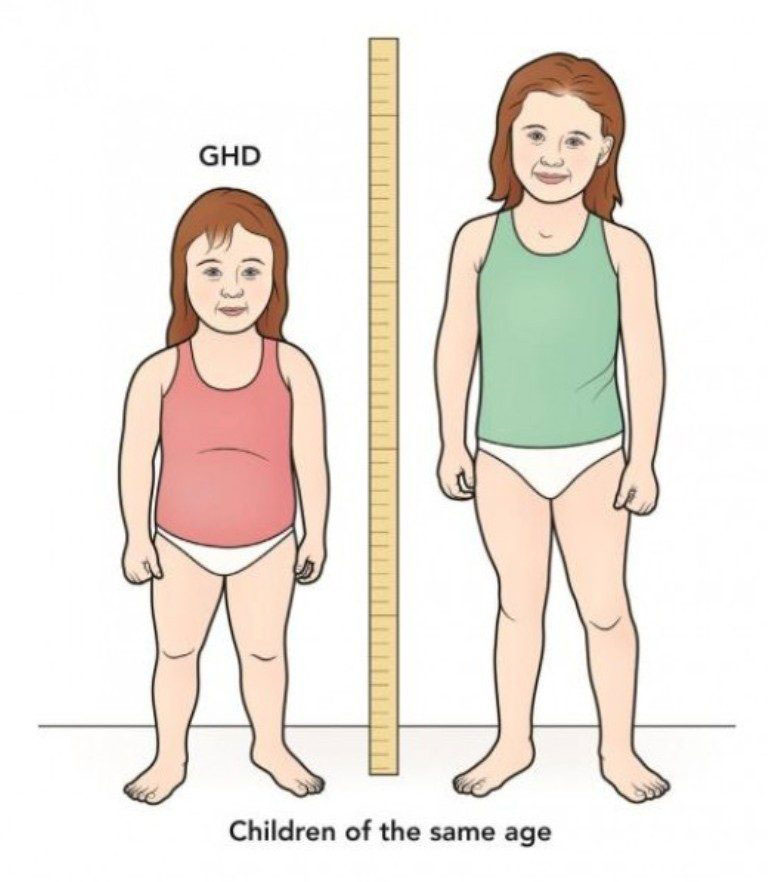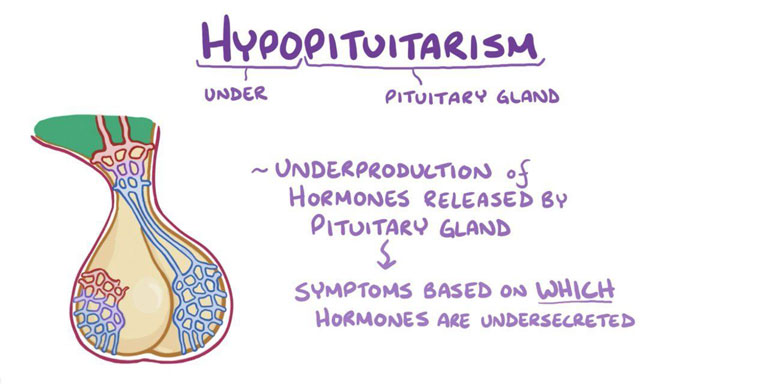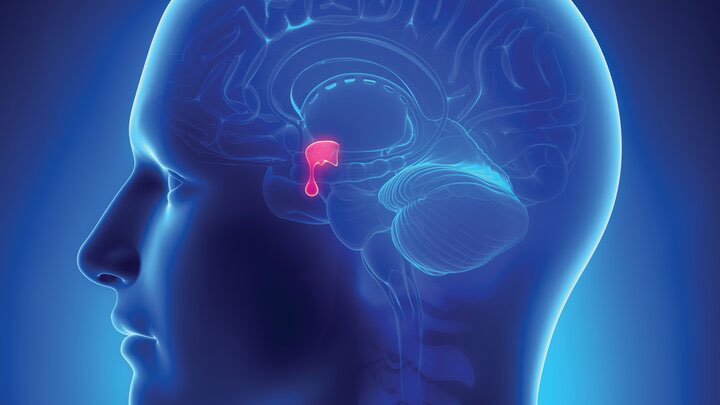WHAT IS HYPOPITUITARISM?
Hypopituitarism is an uncommon disorder in which your pituitary gland fails to produce one or more hormones, or does not produce enough hormones.
The pituitary gland is a kidney-bean-sized gland located at the bottom of your brain. It is part of your body’s endocrine system, which comprises all the glands that produce and regulate hormones. Despite its small size, the pituitary gland makes and releases a number of hormones that act on nearly every portion of your body.
Hypopituitarism is when you have a shortage (deficiency) of one or more of the pituitary hormones. These hormone deficiencies could affect any number of your body’s routine functions, for example, growth, blood pressure, or reproduction. Symptoms generally vary, based on which hormone or hormones you are missing.
If you have hypopituitarism, you will likely require to take medication for the rest of your life. The medicine helps replace the missing hormones, which helps control your symptoms.

HYPOPITUITARISM SYMPTOMS
The signs and symptoms of hypopituitarism generally develop slowly and deteriorate over time. They are sometimes subtle and might be overlooked for months or even years. But for some people, signs, and symptoms develop unexpectedly.
Hypopituitarism’s signs and symptoms change from person to person, depending on which pituitary hormones are affected and to what degree. In people who have more than one pituitary hormone deficiency, the second deficiency might increase or, in some cases, hide the symptoms of the first deficiency.
Growth hormone (GH) deficiency
In children, growth hormone (GH) deficiency might cause growth problems and short stature. Most adults who have growth hormone (GH) deficiency do not have any symptoms, but for some adults, it could cause:
- Fatigue
- Muscle weakness
- Changes in body fat composition
- Lack of ambition
- Social isolation

Luteinizing hormone (LH) and follicle-stimulating hormone (FSH) deficit
The deficiency of these hormones, known as gonadotropins, affects the reproductive system. In women, the deficiency reduces egg and estrogen production from the ovaries. In men, the deficiency reduces sperm and testosterone production from the testicles. Women and men might experience a lower sex drive, infertility, or fatigue. In children and adolescents, delayed puberty is generally the only symptom.
Women might also have symptoms like:
- Hot flashes
- Irregular or no periods
- Loss of pubic hair
- An inability to produce milk for breast-feeding
Men might also have symptoms like:
- Erectile dysfunction
- Decreased facial or body hair
- Mood changes
Thyroid-stimulating hormone (TSH) deficiency
This hormone is responsible for the thyroid gland. A thyroid-stimulating hormone (TSH) deficiency leads to reduced levels of thyroid hormones (hypothyroidism). This causes symptoms like:
- Fatigue
- Weight gain
- Dry skin
- Constipation
- Sensitivity to cold or trouble staying warm
Adrenocorticotropic hormone (ACTH) deficiency
This hormone helps your adrenal glands function properly, and helps your body react to stress. Symptoms of adrenocorticotropic hormone (ACTH) deficiency include:
- Serious fatigue
- Low blood pressure, which might lead to fainting
- Frequent and long-term infections
- Nausea, vomiting, or abdominal pain
- Confusion

Anti-diuretic hormone (ADH) deficiency
This hormone, which is also known as vasopressin, helps your body balance its fluid levels. An anti-diuretic hormone deficiency could cause a disorder known as diabetes insipidus, which could cause:
- Excessive urination
- Extreme thirst
- Electrolyte imbalances
Prolactin deficiency
Prolactin is the hormone that tells the body when to begin making breast milk. Low levels of prolactin could cause women to have problems making milk for breastfeeding.
WHEN SHOULD YOU SEE A DOCTOR?
See your doctor or primary care physician if you develop any of the signs and symptoms related to hypopituitarism.
Contact your doctor or primary care physician immediately if signs or symptoms of hypopituitarism develop unexpectedly or are related to a serious headache, visual disturbances, confusion, or a drop in blood pressure. These can be signs and symptoms of unexpected destruction of the pituitary gland tissue (pituitary apoplexy), usually caused by bleeding into the pituitary gland. Pituitary apoplexy is a medical emergency and needs immediate medical attention.
HYPOPITUITARISM CAUSES
Hypopituitarism has several causes. In many cases, hypopituitarism is because of a tumor of the pituitary gland. As a pituitary tumor increases in size, it could compress and damage pituitary tissue, interfering with hormone production. A tumor could also compress the optic nerves, causing visual disturbances.
In addition to tumors, specific diseases or events that cause damage to the pituitary gland might also trigger hypopituitarism. Instances include:
- Head injuries
- Brain surgery
- Radiation treatment to the head or neck
- Shortage of blood flow to the brain or pituitary gland (stroke) or bleeding (hemorrhage) into the brain or pituitary gland
- Specific medications, for example, narcotics, high-dose corticosteroids, or specific cancer drugs are known as checkpoint inhibitors
- Inflammation of the pituitary gland due to an abnormal immune system response (hypophysitis)
- Infections of the brain, for example, meningitis, or infections that could spread to the brain, like tuberculosis or syphilis
- Infiltrative diseases, which affect various parts of the body, including sarcoidosis, an inflammatory disease happening in various organs; Langerhans cell histiocytosis, in which abnormal cells cause scarring in several parts of the body; and hemochromatosis, which causes excess iron deposits in the liver and other tissues
- Serious loss of blood during childbirth, which might cause damage to the front part of the pituitary gland (Sheehan’s syndrome or postpartum pituitary necrosis)
In some cases, hypopituitarism is due to a genetic mutation (inherited). These mutations affect the pituitary gland’s ability to produce one or more of its hormones, usually beginning at birth or in early childhood.
Tumors or diseases of the hypothalamus, a part of the brain situated just above the pituitary, also could cause hypopituitarism. The hypothalamus produces hormones of its own that directly impact the activity of the pituitary gland.
In some cases, the cause of hypopituitarism is not known.
HYPOPITUITARISM DIAGNOSIS
If your doctor or primary care physician suspects a problem with your pituitary hormones, he or she will likely order various tests to check hormone levels in your body and search for a cause.
Your doctor or primary care physician might order tests including:
- Blood tests – These tests measure hormone levels in your body. For instance, blood tests could identify low levels of thyroid, adrenal or sex hormones. The tests could determine if these low levels are related to pituitary hormone production.
- Stimulation or dynamic testing – These tests measure hormone levels in your body. Your doctor or primary care physician might recommend that you go to a clinic that specializes in endocrine conditions for these tests. These tests check your body’s hormone levels after you have taken specific medications to stimulate hormone production.
- Brain imaging – Magnetic resonance imaging (MRI) or high-resolution computerized tomography (CT) of your brain could detect a pituitary tumor or other pituitary gland problems.
- Vision tests – These tests could determine if the growth of a pituitary tumor has impaired your sight or visual fields.

HYPOPITUITARISM TREATMENT
The first step in treating hypopituitarism is usually medication to help your hormone levels return to normal. This is generally known as hormone replacement because the dosages are set to match the amounts that your body would produce if it did not have a pituitary problem. You might require to take the medication for the rest of your life.
In some cases, treatment of the condition causing hypopituitarism might lead to a complete or partial recovery of your body’s ability to produce pituitary hormones.
Medications
Hormone replacement medications might include:
- Corticosteroids – These drugs, for example, hydrocortisone (Cortef) or prednisone (Rayos), replace the adrenal hormones that are not being produced because of an adrenocorticotropic hormone (ACTH) deficiency. You can take them by mouth.
- Levothyroxine (Levoxyl, Synthroid, others) – This medication treats the low thyroid hormone levels (hypothyroidism) that a thyroid-stimulating hormone (TSH) deficiency could cause.
- Sex hormones – These include testosterone in men and estrogen or an amalgamation of estrogen and progesterone in women. Testosterone is injected either by injection or through the skin with a patch or a gel. Female hormone replacement could be injected with pills, gels, or patches.
- Growth hormone – Also known as somatropin (Genotropin, Humatrope, others), growth hormone is injected through an injection beneath your skin. It promotes growth, which helps produce a more natural height in children. Adults with symptoms of growth hormone deficiency also might benefit from growth hormone replacement, but they would not grow taller.
- Fertility hormones – If you have become infertile, gonadotropins could be injected by injection to stimulate ovulation in women and sperm production in men.
Monitoring and adjusting medication
A doctor or primary care physician who specializes in endocrine disorders (endocrinologist) might monitor your symptoms and the levels of these hormones in your blood to make sure you are getting the appropriate amounts.
If you are taking corticosteroids, you will require to work with your doctor or primary care physician to adjust your medication dosage during times of major physical or emotional stress. During these times, your body would generally produce extra cortisol hormone to help you manage the stress.
The same kind of fine-tuning of dosage might be necessary when you have the flu, experience diarrhea or vomiting, or have surgery or dental procedures. Adjustments in dosage might also be required during pregnancy or with marked changes in weight.
Diseased Lungs
Surgery or other procedures
You might require periodic CT or MRI scans to monitor a pituitary tumor or other diseases causing hypopituitarism. Treatment for pituitary tumors might involve surgery to remove the growth. In some cases, radiation treatment or medications are suggested to control the hidden cause.
In case of emergency
If you have hypopituitarism, it is crucial to wear a medical alert bracelet or pendant and carry a special card informing others in emergency situations, for instance of your condition. This is particularly important if you are taking corticosteroids for an ACTH deficiency.
If you or anyone you know is suffering from hypopituitarism, our expert providers at Specialty Care Clinics will take care of your health and help you recover.
Call 469-545-9983 to book a telehealth appointment for an at-home check-up.
